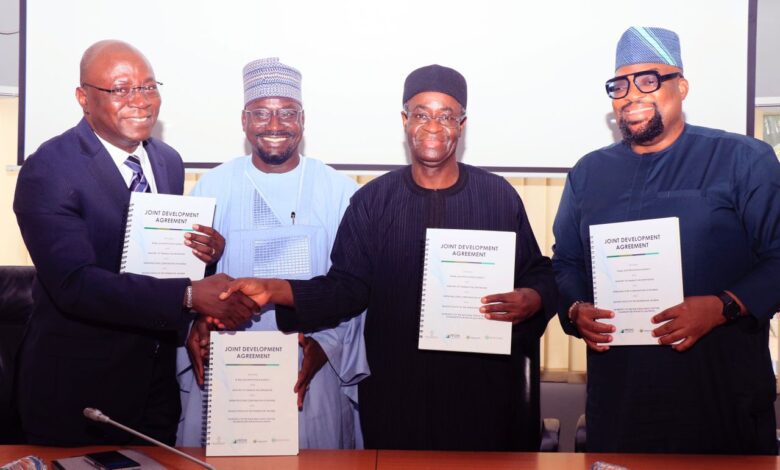In a landmark move that marks a major milestone in Nigeria’s energy transition journey, the Rural Electrification Agency (REA) has officially signed a Memorandum of Understanding (MoU) with the Budget Office of the Federation, Infrastructure Corporation of Nigeria (InfraCorp), and the Ministry of Finance Incorporated (MOFI), marking the official launch of the National Public Sector Solarization Initiative (NPSSI).
Tribune Online reports that NPSSI, is a flagship government-led programme, designed to accelerate the deployment of distributed solar energy solutions across Nigeria’s public sector institutions including schools, hospitals, security posts, government offices and more.
The joint agreement signing, has as its core initiative, the urgent need to power critical infrastructure with clean, reliable energy while moving away from diesel dependence and reducing the public sector’s carbon footprint not only strengthens the alliance and collaboration between the government and the private sector in the energy sector but also aims to advance the nation’s drive for localized renewable energy infrastructure and reverse unsustainable energy financing mechanisms.
The Managing Director/CEO of the Rural Electrification Agency (REA), Abba Abubakar Aliyu, in his remarks, said NPSSI is part of a broader strategy to position Nigeria as the renewable energy hub of Africa while promoting innovation, local manufacturing and sustainability in energy infrastructure financing in Nigeria.
He said, “What makes this truly remarkable is the collaborative spirit behind it. We are witnessing a new era of inter-agency synergy, driven by creativity, fiscal responsibility and a shared determination to reduce the cost of governance while meeting our national energy transition goals.”
While providing an overview of the initiative, the REA boss added, “The NPSSI is a flagship, government-led programme designed to accelerate the deployment of distributed solar energy solutions across Nigeria’s public sector institutions: schools, hospitals, security posts, government offices, and more.
“At its core, this initiative was birthed from a strategic national priority: the urgent need to power critical infrastructure with clean, reliable energy while moving away from diesel dependence and reducing the public sector’s carbon footprint.
The Director-General of the Budget Office of the Federation, Dr Tanimu Yakubu, emphasised the significance of the initiative in addressing Nigeria’s long-standing energy gap and strengthening the fiscal efficiency of public sector operations.
“Solarization has come of age as a necessity and NPSSI will provide an added opportunity to optimize the demonstrated ability of public institutions to pay for clean, sustainable energy, which is what the capital market needs to ensure bankability,” Dr Yakubu said.
The MD/CEO of InfraCorp, Dr Lazarus Angbazo, also described the initiative as a model for the future of infrastructure financing in Nigeria.
“For decades, the sector has relied solely on public financing and while government is indispensable, government is not enough to solve the energy challenge hence the need to optimize the Federal Government’s NPSSI as a pathway to drive localization of energy capability and supply chain integration.”
MD of MOFI, Dr Armstrong Takang, who was represented by Dr. Femi Ogunseinde, MOFI’s Chief Investment Officer, said there is the need for evolving funding models for Nigeria’s energy sector.
“Our energy mix has historically been unfairly weighted on fossil fuel, which is expensive to sustain. We must not underestimate the importance of creating business models that drive down the cost of power while expanding access. We must now chart a new course, one that deemphasizes the use of sovereign guarantees, domestically anchored and investment-ready.”
With far-reaching objectives, the NPSSI is aimed at sustainably eliminated dependence on diesel generators and high electricity bills and advance energy access, sustainability culture and local job creation.
Phase 0 of the NPSSI is fully funded by the Federal Government of Nigeria to the tune of N100 billion and it is expected that subsequent phases will harness innovative and blended financing models leveraging private capital from both local and international long-term funders, all under structures that eliminate sovereign guarantees and contingent liabilities.
ALSO READ TOP STORIES FROM NIGERIAN TRIBUNE
WATCH TOP VIDEOS FROM NIGERIAN TRIBUNE TV
- Let’s Talk About SELF-AWARENESS
- Is Your Confidence Mistaken for Pride? Let’s talk about it
- Is Etiquette About Perfection…Or Just Not Being Rude?
- Top Psychologist Reveal 3 Signs You’re Struggling With Imposter Syndrome
- Do You Pick Up Work-Related Calls at Midnight or Never? Let’s Talk About Boundaries







